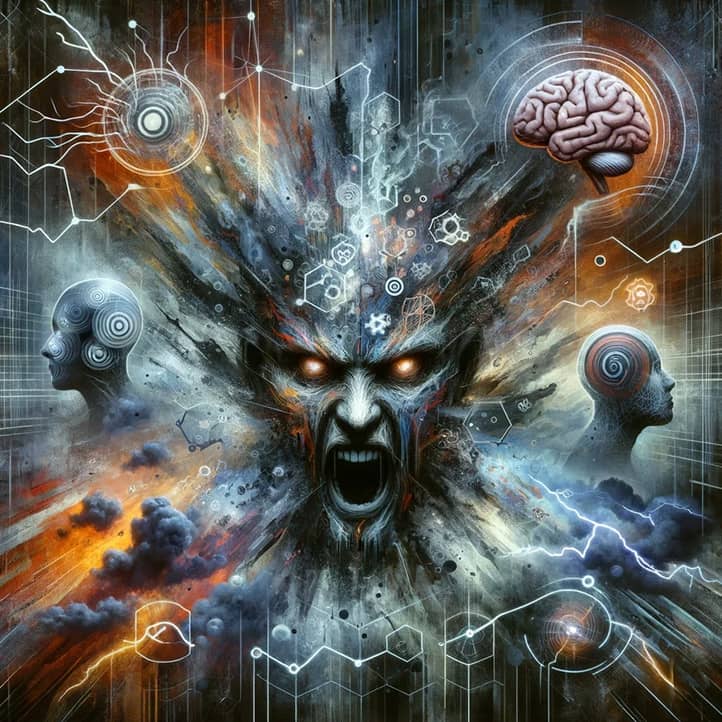Named after the Italian Renaissance thinker Niccolò Machiavelli, Machiavellianism is a philosophy and strategy that prioritizes achieving goals over moral considerations. But is Machiavellianism simply an art of manipulation, or is it a necessary tool for survival in today’s complex world?
What is Machiavellianism?
Machiavellianism is a strategic approach to interpersonal relationships and social interactions, characterized by a cynical disregard for morality and a focus on self-interest. People with high levels of Machiavellianism tend to manipulate others, often using cunning, flattery, and strategic thinking to achieve their objectives.
Niccolò Machiavelli (1469-1527) was an Italian diplomat, political philosopher, and writer of the Renaissance period. He is best known for his treatise The Prince, written in 1513 and published posthumously in 1532. In this work, Machiavelli describes, often with ruthless realism, methods by which a ruler can acquire and maintain political power. His ideas, which many have interpreted as a justification of immoral behavior in politics, became the foundation for the concept of Machiavellianism.
In today’s world, where competition pervades all areas of life—from business and politics to personal relationships—Machiavelli’s ideas remain highly relevant. We live in an era where success is often linked to the ability to “play by the rules,” even when these rules may not be ethical. Social media and digital technology have created new arenas for manipulation and strategic self-promotion, making an understanding of Machiavellianism crucial for navigating modern society.

The Origins of Machiavellianism
The philosophy of Machiavellianism was born from the turbulent cauldron of the Italian Renaissance, a time when old traditions were collapsing, and new ideas were emerging through the cracks in the foundations of the medieval worldview. This period was marked not only by the flourishing of arts and sciences but also by brutal political struggles, intrigue, and the constant threat of foreign invasion.
Witnessing and partaking in these events, Machiavelli developed his views under the influence of the real politics of his time. He saw noble ideals shattered by harsh realities, principles giving way to pragmatism, and moral imperatives yielding to the necessity of survival.
Machiavelli’s ideas can also be seen as a reaction to the prior tradition of political thought. While medieval thinkers often looked to ideal models of governance based on Christian morality, Machiavelli offered a realist’s perspective on politics, separating it from ethics and religion.
The Life and Works of Niccolò Machiavelli
Niccolò Machiavelli was born in Florence in 1469 to a family of lawyers. He lived through a turbulent period in Italian history, marked by constant wars and political intrigue. Machiavelli began his career as a diplomat and civil servant for the Florentine Republic, giving him firsthand experience in politics and diplomacy.
However, his career abruptly ended in 1512, when the Medici family returned to power in Florence. Machiavelli was arrested, tortured, and exiled. During this period of enforced separation from political life, he wrote his most famous works, including The Prince and Discourses on Livy.
Beyond political treatises, Machiavelli also wrote plays, poems, and historical works. His versatility as a writer and thinker reflects his deep understanding of human nature and society.
Key Ideas in “The Prince”
“The Prince“ is Machiavelli’s most renowned and influential work. In it, he outlines his views on effective governance, based on observations of the real politics of his time. Some key ideas include:
- The ends justify the means: Perhaps Machiavelli’s most famous (and often misinterpreted) idea. He argued that a ruler must be prepared to act immorally if necessary to preserve the state.
- The importance of reputation: Machiavelli emphasized that it is more important for a ruler to appear virtuous than to actually be virtuous.
- The balance between love and fear: He advised that it is better to be feared than loved if both cannot be achieved.
- The necessity of adaptation: Machiavelli argued that a successful ruler must be able to adapt to changing circumstances.
- Realism in politics: He urged rulers to see the world as it is, not as it should be.
Historical and Political Context of Machiavellianism
Machiavelli lived and wrote during the Italian Renaissance, a period of great cultural and intellectual achievement but also a time of political instability and ongoing conflict among the Italian city-states.
Florence, Machiavelli’s hometown, was a republic but constantly under threat from both internal and external enemies. Machiavelli’s experience in diplomatic service showed him how fragile political power can be and how quickly alliances can change.
Additionally, Italy at the time was a battleground for major European powers, particularly France and Spain. Machiavelli saw Italians being used as pawns in a larger game, which influenced his thinking on the need for a strong, unified Italian state.
Thus, Machiavellianism emerged as a response to specific historical and political circumstances – a guide for rulers in a world Machiavelli saw as cruel, unpredictable, and dangerous.

Machiavellianism as the Art of Manipulation
Manipulation is a dance of shadows where every move is calculated, every word weighed, and every gesture has hidden meaning. Machiavellianism elevates this art to high strategy, offering tools for those who seek to control not only situations but also the people around them.
At the heart of Machiavellian manipulation lies a deep understanding of human nature. It is not simply a set of tricks but a complex system based on knowledge of psychology, social dynamics, and human weaknesses. A Machiavellian is a kind of social engineer, skillfully using others’ emotions, fears, and desires to achieve their goals.
However, the art of manipulation is a double-edged sword. While it may bring short-term success, it often comes at the cost of long-term relationships and reputation. The Machiavellian risks becoming trapped in their own intrigues, losing trust and ending up isolated.
Key Principles of Machiavellian Strategy
- Pragmatism: The Machiavellian approach assesses situations from a practical benefit standpoint, not moral considerations.
- Flexibility: The ability to adapt to changing circumstances and alter behavior as needed.
- Strategic thinking: Planning ahead and considering the long-term consequences of actions.
- Impression management: Controlling how others perceive you, even if it means creating a false image.
- Emotional detachment: The ability to make decisions without being influenced by emotions.
Psychological Aspects of Manipulation
Machiavellian manipulation often relies on a deep understanding of human psychology. Some key psychological aspects include:
- Exploiting fears and desires: Manipulators often play on basic human emotions like fear of loss or desire for recognition.
- Using cognitive biases: Manipulators may exploit cognitive biases such as confirmation bias or availability heuristics.
- Creating dependency: Manipulators may seek to create situations where others are emotionally or materially dependent on them.
- Exploiting social norms: Leveraging social expectations and norms of politeness to achieve goals.
Examples of Machiavellianism in Politics and Business
In politics, Machiavellian strategies can manifest in various forms:
- Building coalitions: Politicians may form temporary alliances to achieve specific goals, even with ideological opponents.
- Media control: Managing information and shaping public opinion through the media.
- Distraction tactics: Creating “smoke screens” or diversions to mask unpopular decisions.
In business, Machiavellian tactics are also widespread:
- Aggressive negotiations: Applying psychological pressure and manipulation in negotiations.
- Corporate espionage: Gathering information about competitors by any means possible.
- Market manipulation: Using information or resources to influence market conditions to one’s advantage.
While these strategies may be effective in the short term, they often lead to negative long-term consequences, including loss of trust and reputation.

Machiavellianism as a Survival Mechanism
In a world where resources are limited and competition is fierce, Machiavellianism can be not just a strategy but a necessity. It resembles a form of social Darwinism, where survival depends not on being the strongest or kindest but on being the most adaptive and strategically minded.
Machiavellian strategies can serve as a protective mechanism in a hostile environment. They enable people to foresee threats, neutralize opponents, and maximize their chances of success. In a way, Machiavellianism can be seen as a form of social intelligence, allowing individuals to navigate complex social landscapes effectively.
However, viewing Machiavellianism as a survival mechanism raises a paradox. Strategies that may secure individual survival potentially undermine the foundations of social cooperation, without which long-term societal prosperity is impossible.
Adaptation to Complex Social Conditions
- Social flexibility: The ability to adapt to various social contexts may be key to surviving in a shifting environment.
- Strategic alliance-building: The skill of choosing the right allies and maintaining beneficial relationships can provide protection and access to resources.
- Pragmatic decision-making: In critical situations, the ability to make decisions based on practical considerations rather than emotions or ideals may be vital.
Defensive Mechanisms and Self-Preservation Strategies
Machiavellian tactics can act as defensive mechanisms in a hostile or unpredictable environment:
- Emotional distancing: The ability to remain emotionally detached can protect against manipulation and exploitation by others.
- Information control: Carefully managing information about oneself can help avoid vulnerability.
- Preventive actions: The ability to anticipate potential threats and act preventively can ensure safety.
Machiavellianism in Evolutionary Psychology
From an evolutionary psychology perspective, Machiavellian traits may have developed as an adaptive strategy:
- Social intelligence: The ability to understand and manipulate social situations could provide an evolutionary advantage.
- Strategic flexibility: Being able to switch between cooperation and competition depending on the context may have increased survival and reproduction chances.
- Resource competition: In resource-scarce environments, competing effectively—even through morally questionable means—might have been key to survival and gene transmission.
- Deception as an adaptive strategy: The ability to deceive and manipulate could offer advantages in certain social contexts, allowing individuals to gain benefits without direct conflict.
It is crucial to note that evolutionary explanations do not justify immoral behavior; they merely suggest a possible origin and persistence of such behaviors in human psychology.

Ethical Aspects of Machiavellianism
The ethics of Machiavellianism are a maze of moral dilemmas where every turn poses challenging choices. Here, utilitarian considerations clash with deontological principles, individual interests with public good, and short-term gains with long-term consequences.
Machiavellianism questions traditional ethical systems, promoting a pragmatic approach to morality. It raises uncomfortable questions: “Is honesty always the best policy?” “Are there situations where deception may be justified?” “Where is the line between strategic thinking and manipulation?”
Analyzing Machiavellianism ethically also brings up questions about power and responsibility. If a leader uses Machiavellian methods to achieve good ends, do the ends justify the means? And who should determine what constitutes “good” in a complex and diverse society?
Moral Dilemmas Related to Machiavellian Behavior
- Ends justify the means: The central ethical question of Machiavellianism—is it acceptable to justify unethical actions if they lead to positive outcomes?
- Individualism vs. collectivism: Machiavellianism often prioritizes personal interests over the public good. Is this ethical in a social context?
- Truth vs. lies: Machiavellian strategies often involve deception and manipulation. Are there situations where lying could be ethically acceptable?
- Short-term gains vs. long-term consequences: Is it ethical to pursue short-term goals if they may lead to long-term harm?
Critiques of Machiavellianism from an Ethical Perspective
- Violation of autonomy: Machiavellian manipulation can infringe on people’s right to make autonomous decisions.
- Utilitarian concerns: Even from a utilitarian viewpoint, Machiavellianism can be problematic if it diminishes overall societal welfare.
- Erosion of trust: Widespread Machiavellian behavior can undermine social trust, which is crucial for society’s functioning.
- Dehumanization: Treating people as means to an end, rather than as intrinsically valuable beings, contradicts Kantian ethics and many other ethical frameworks.
Possible Justifications for Machiavellian Strategies
- Consequential ethics: From a consequentialist perspective, Machiavellian actions may be justified if they result in greater good.
- Self-defense: In situations where an individual is under threat, Machiavellian strategies could be seen as a legitimate form of self-protection.
- Extreme circumstances: In crises where lives are at stake, some might argue that Machiavellian actions are necessary.
- Cultural relativism: In some cultures and contexts, certain Machiavellian strategies may be regarded as normal social interaction.

Machiavellianism in Modern Society
Today’s society, with its complex social structures, global connections, and digital technologies, creates new contexts for Machiavellianism. The digital age opens unprecedented opportunities for manipulating information and public opinion, blurring the lines between reality and illusion.
In a world where reputation and image are often valued above actual achievements, Machiavellian impression management strategies are increasingly sophisticated. Social media, PR technologies, and big data can serve as tools for the modern Machiavellian.
However, the same transparency and interconnectedness that define the modern world make the long-term use of Machiavellian tactics increasingly risky. A damaged reputation may be irreparably lost in the age of viral information.
Manifestations of Machiavellianism Across Different Life Spheres
- Politics: Modern politics often involves strategic alliances, public opinion management, and a pragmatic approach to decision-making, reflecting Machiavellian principles.
- Business: The corporate world sometimes exhibits Machiavellian tactics in competitive practices, mergers and acquisitions, and strategic planning.
- Media and PR: Managing information and shaping public opinion frequently involves elements of Machiavellianism.
- Personal relationships: Even in interpersonal relationships, people may use Machiavellian strategies to achieve their goals.
Impact of Machiavellianism on Interpersonal Relationships
- Trust and suspicion: Awareness of Machiavellian tactics may lead to increased suspicion in relationships.
- Emotional distance: Individuals with high levels of Machiavellianism may struggle to form deep emotional connections.
- Manipulative relationships: Machiavellianism may manifest in manipulative behaviors within romantic and friendships.
- Value conflicts: Differences in Machiavellian levels can lead to conflicts and misunderstandings.
Machiavellianism in the Era of Social Media and Information Technologies
- Managing online reputation: Social media offers new opportunities for strategically managing one’s image.
- Information manipulation: The spread of fake news and disinformation can be seen as a modern form of Machiavellianism.
- Algorithmic manipulation: Using algorithms to influence user behavior can be considered a technological form of Machiavellianism.
- Cybersecurity: In cybersecurity, Machiavellian strategies may be used both for attack and defense.

Psychological Studies of Machiavellianism
The psychology of Machiavellianism is a fascinating journey into human nature. Studies in this field reveal a complex picture of relationships between personality traits, cognitive processes, and social behavior.
Neurobiological research on Machiavellianism opens new avenues for understanding this phenomenon. It allows us to peer into the Machiavellian brain, see how neural networks are activated in strategic decision-making, how social information is processed, and how emotional responses are shaped.
Studying Machiavellianism also raises intriguing questions about the nature of human consciousness and free will. To what extent are our choices and actions determined by innate character traits? Can we consciously control and modify our level of Machiavellianism?
Machiavellianism as a Personality Trait
- Definition: In psychology, Machiavellianism is seen as a personality trait characterized by a cynical worldview, pragmatic morality, and a tendency toward manipulative behavior.
- Measurement: Psychologists have developed scales, such as Mach-IV, to measure Machiavellianism levels.
- Stability: Studies show that Machiavellianism is relatively stable over time, although it may change due to life experiences.
Relation of Machiavellianism to Other Psychological Constructs
- Dark Triad: Machiavellianism is often viewed as part of the “Dark Triad” of personality traits, along with narcissism and psychopathy.
- Emotional intelligence: Studies reveal a complex link between Machiavellianism and emotional intelligence; high Machiavellianism can be associated with both high and low EI.
- Empathy: Machiavellianism typically has a negative correlation with empathy, especially with its affective component.
- Big Five: Within the Big Five personality traits model, Machiavellianism is negatively correlated with agreeableness and conscientiousness.
Methods of Measuring and Diagnosing Machiavellianism
- Mach-IV Scale: The most widely used tool for measuring Machiavellianism, developed by Richard Christie and Florence Geis in 1970.
- Triarchic Measure of Machiavellianism (TriMM): A more modern tool that considers the multidimensional nature of Machiavellianism.
- Behavioral experiments: Researchers also use laboratory experiments to study Machiavellian behavior in controlled settings.
- Neuroimaging: Modern research uses neuroimaging to explore neural correlates of Machiavellianism.

Alternatives to Machiavellianism
In seeking alternatives to Machiavellianism, we turn to the rich heritage of philosophical and psychological thought. From Aristotle’s virtue ethics to modern concepts of emotional intelligence, the history of human thought offers many paths to success and influence without manipulation or deceit.
It is interesting to explore how different cultural traditions approach leadership and social influence. For example, Eastern philosophies with their emphasis on harmony and balance provide a distinctly different view on interacting with the world and others than Western Machiavellianism.
Modern research in positive psychology and neuroleadership also suggests new success models based on authenticity, empathy, and cooperation. These approaches are not only ethical but are often more effective in the long term, especially in the context of contemporary organizations and communities.
Ethical Goal Achievement Strategies
- Transparency and honesty: Open and honest communication can build trust and long-lasting relationships.
- Cooperation over competition: Seeking mutually beneficial solutions can lead to better outcomes for all parties.
- Ethical leadership: Leadership grounded in ethical principles can inspire and motivate people more effectively than manipulation.
- Long-term thinking: Focusing on long-term consequences over short-term gains can lead to more sustainable results.
The Development of Emotional Intelligence and Empathy
- Self-awareness. Understanding one’s own emotions and motives helps facilitate more effective interactions with others.
- Empathy. Developing the ability to understand and share the feelings of others enhances relationships and communication.
- Emotion Regulation. The ability to manage one’s emotions supports goal achievement without the need for manipulation.
- Social Skills. Developing skills in effective communication and conflict resolution can serve as an alternative to manipulative tactics.
Balancing Personal Interests and Social Welfare
- Virtue Ethics. Focusing on cultivating personal qualities such as honesty, courage, and fairness can lead to a more harmonious life.
- Social Responsibility. Recognizing one’s role in society and striving for the common good can be more fulfilling than selfish actions.
- Sustainable Development. Making decisions that consider long-term societal and environmental impacts.
- Reciprocity. Building relationships based on mutual benefit and respect may be more effective than one-sided manipulation.

Conclusion
Machiavellianism, as a philosophy and strategy, continues to stir intense debate in modern society. On one hand, it offers effective tools for achieving goals in a complex and often hostile world. Machiavellian thinking assists in navigating the intricate mazes of politics, business, and social relations, providing a pragmatic view of reality, free from naive illusions and moralizing.
However, the cost of this approach can be high. Machiavellianism risks undermining the foundations of trust and cooperation upon which a healthy society depends. It can lead to social isolation, loss of reputation, and profound inner conflicts. In a world where long-term success increasingly relies on the ability to build strong relationships and create shared value, a purely Machiavellian approach may prove counterproductive.
Perhaps the key to understanding the role of Machiavellianism in the modern world lies in finding a balance. Some elements of Machiavellian thinking, such as strategic planning and adaptability, can be useful when applied ethically and with consideration for long-term consequences. At the same time, it’s essential to develop alternative approaches grounded in emotional intelligence, authenticity, and mutual respect.
Ultimately, the issue is not about wholly accepting or rejecting Machiavellianism but about cultivating critical thinking and ethical reflection. We must learn to recognize Machiavellian strategies, understand their potential consequences, and make conscious choices in each specific situation. Only in this way can we effectively navigate the complex moral landscape of today’s world, while preserving our integrity and contributing to a more just and harmonious society.




